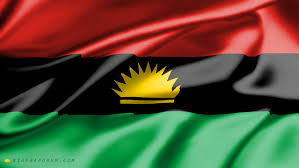By Kenneth Amaeshi
There are many ways to interpret Biafra – a struggle, a movement for emancipation, an expression of collective injury and victimisation, et cetera. Depending on where you stand, these different interpretations of Biafra could either resonate with you or push you away from the agenda. As such, Biafra is simultaneously attractive and repelling.
For some reason, it is this inherent tension in Biafra that makes it appealing. This is especially so, if one positions Biafra as a metaphor – “a thing regarded as representative or symbolic of something else”.
Seen as a metaphor, Biafra can act as a good hook for introspection and critical thinking for the Igbo people, in particular. They seem to be at the fore front of Biafra for obvious reasons including structural injustices and marginalisation. The purpose is not to rehearse these here. Simon Kolawole’s recent “Biafra is not a dirty word” did that brilliantly.
While the focus, of late, has been so much on the poor relationship between the Igbos and the presidency, it is important to resist the total seduction of this narrative and refocus attention on the immense opportunities from within, which Biafra as a metaphor can offer.
First and foremost, the South East is full of potentials. These potentials can be unlocked and harnessed through good governance, which is often in short supply. Anambra State, through massive investments in education and road infrastructure recently, appears to have a foretaste of what good governance can achieve.

Secondly, there is no need for the Igbo people to be overly obsessed about the centre. They do not necessarily need an Igbo President for the potential opportunities in the zone to be harnessed. All they need to pray and ask for is a good Nigerian leader who can see and treat every part of Nigeria as equal and important. An Igbo President, which seems to be often orchestrated by some self-centred politicians, is not necessarily a panacea to myriad development challenges in the region. However, there is every need for the Igbo people to look inwards and draw strength from within.
Thirdly, secession, as glamorous as it may sound, may not be the solution to the needs and pains of the Igbo people. There are many examples in the world, where secession has failed woefully. Agitating for secession without a good plan and strategy, as it seemingly looks at the moment, is a grand recipe for disaster.
Based on these reasons, Biafra, as a metaphor, should afford the Igbo people the opportunity to ask tough questions: “What sort of society are they and would they like to be? What sort of economy will fit this ideal society they aspire to be? What sort of governance will make this ideal society feasible?” These are some of the pressing questions, which should preoccupy the Igbo elites and intelligentsia at this point in time. This is an opportunity to revisit Igbo philosophy and worldview in contemporary Nigeria. It will take more than placards and sit-at-home strategies to address these questions.
The worst mistake the Igbo people can make with Biafra is to allow it to be hijacked by thugs and rogues. And these abound. Biafra, as a metaphor, should offer the opportunity to re-assess political leadership and governance in the South East. No South East State is governed by an outsider. Biafra, as a metaphor, should offer an opportunity to hold current leadership at the State level accountable. It should also offer an opportunity to set leadership and governance benchmarks for the future.
Igbo people need to come together in a meaningful and strategic manner. The region needs a lot more inter-state collaboration to unlock and harness the development opportunities in the region. The Igbo people are known for entrepreneurship. There is a readily available energy and human capital waiting to be gainfully exploited and employed here.
It is obvious that there is no significant Federal Government presence in the South East in the scale of what the Federal Government did in Lagos and what it does in Abuja today. But instead of expending negative energy on the failures of the Federal Government to recreate a Lagos or an Abuja in the South East, the zone can choose to focus positive energy on how to make the best of what it gets from the centre and can generate from within. This is, again, where the entrepreneurial and enterprising characteristics of the region should make a visible difference to the situations on ground.
Recognising the land-lock nature of the South East, Biafra as a metaphor should also afford Igbo people the opportunity to explore and fine-tune their relationships with their neighbours. This has, unfortunately, not always been smooth – especially, after the civil war. But the prospects of good neighbourliness are there. As such, Biafra as a metaphor is also about being a good neighbour.
Igbo people and their neighbours can focus on developing a viable entrepreneurial ecosystem to support the human ingenuity the zones are known for. Imagine a situation where Aba, Nnewi, Onitsha, Abakaliki, Port Harcourt, and Calabar are strategically organised to form a solid cluster. This will, amongst others, involve the universities, professional services firms, venture capitalists and financiers of innovation. It will not only enhance the production and export of commodities abundant in these zones, it will also create jobs, reduce brain drain, and enhance the wealth in the zones. Unfortunately, such ideas and thoughts are blatantly and worryingly absent.
Finally, Biafra as a metaphor is an opportunity that shouldn’t be lost in the midst of agitations, struggles, and sit-at-home strategies. Biafra as a metaphor can be a source of positive energy for the Igbo people and the Nigerian leadership – for, according to Holderlin – a German poet – “where danger lies, also lies the saving power”. And particularly for the Igbo people: “Onye ajuru aju, anaghi aju onwe ya” (a man forsaken by others, doesn’t need to forsake himself, as well).
May the souls of those who paid the ultimate price during the civil war continue to rest in peace!
*Amaeshi is professor of business and sustainable development, University of Edinburgh Business School, UK, and a visiting professor of strategy and governance, Lagos Business School, Nigeria. He tweets @kenamaeshi












